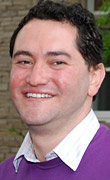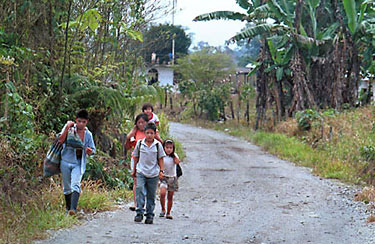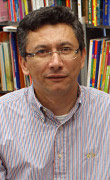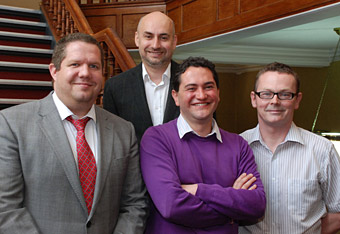UN looks to report by Hudds researcher in Colombian civil war
Mon, 09 Dec 2013 14:27:00 GMT
Ground-breaking study focuses on the use of communicative citizenship to realise human rights amongst groups seeking to establish sustainable peace in the wake of the devastating war
 THE government of Colombia – a country rebuilding itself after a long armed conflict – is paying close attention to the findings of a University of Huddersfield PhD student whose expertise was sought by the United Nations to research and write a special report.
THE government of Colombia – a country rebuilding itself after a long armed conflict – is paying close attention to the findings of a University of Huddersfield PhD student whose expertise was sought by the United Nations to research and write a special report.
One of the recommendations made by Camilo Tamayo Gómez (pictured) – who is Colombian himself – is that the country should have a more plentiful and diverse media sector.
“We have two or three really important newspapers in Colombia, but there is a media deficit in the country,” says Camilo. “So an important aspect of the peace process is the creation of new media with different political positions, leading to a more open democracy and a more open public sphere.”
 This, says Camilo, is one of the aspects of his report that has earned an interested response from the government.
This, says Camilo, is one of the aspects of his report that has earned an interested response from the government.
The background to Camilo’s research is that since September 2012, the Colombian government and the Revolutionary Armed Forces of Colombia (FARC) have engaged in a peace process in order to end the country’s armed conflict, which began in 1964 and saw over 220,000 people killed and more than five million – 94% of them civilians – affected by the fighting.
Peace talks initiated by the Norwegian and Cuban governments have covered a range of issues including land reform, political participation, disarmament of the rebels, drug trafficking, the rights of the victims and the implementation of a long-term peace deal. The United Nations is helping this peace process talks by commissioning different reports about issues and topics that can help the Colombian Government and FARC resolve their differences.
Camilo, who is from Bogota, the capital of Colombia, personally witnessed violent incidents. Before he relocated to the UK for postgraduate study, he worked with non-governmental organisations and the UN.
Having completed a Master’s degree in political philosophy in the UK, he was awarded a Sir John Ramsden Scholarship, which brought him to Huddersfield and he has been based in the University’s School of Human and Health Sciences since 2011, working on a PhD thesis – nearing completion – entitled Communicative Citizenship: another dimension of rights.
It explores the development of post-conflict civil society in Colombia, and Camilo has undertaken extensive field-work in the Eastern Antioquia region, interviewing representatives of women’s groups in areas strongly affected by the recent conflict. His ground-breaking study focuses on the use of communicative citizenship to realise human rights amongst groups seeking to establish sustainable peace in the wake of the devastating war.
 The United Nations Development Programme (UNDP) and the Gabriel Garcia Márquez Foundation for New Latin American Journalism invited Camilo and his former tutor Jorge Bonilla (pictured left) of the Colombian university EAFIT – based in Medellin – to write a report about the relationship between mass media, journalism and the armed conflict between 2002-2012.
The United Nations Development Programme (UNDP) and the Gabriel Garcia Márquez Foundation for New Latin American Journalism invited Camilo and his former tutor Jorge Bonilla (pictured left) of the Colombian university EAFIT – based in Medellin – to write a report about the relationship between mass media, journalism and the armed conflict between 2002-2012.
The full title of the now completed report is The Duty of Memory: Research Agenda of the Mass Media Informative Coverage of the Armed Conflict in Colombia, 2002-2012. It identifies a number of ways to resolve the armed conflict and aid post-conflict recognition of the victims and their memories. There are perspectives from journalists, academics and civil society organisations, debating the role of mass media in the future post-conflict Colombia, the responsibility of the Colombian government to create plural public spheres to consolidate democracy in the country, and the importance of memory narratives as a tool to dignify the victims.
Commenting on his participation in the UNDP programme, Camilo said: “I am really pleased to be part of a generation of Colombians that are supporting this peace process from their particular professions.
 Pictured right: Dr Pete Woodcock, Dr Chris Gifford, Camilo Tamayo Gómez and Dr Andy Mycock.
Pictured right: Dr Pete Woodcock, Dr Chris Gifford, Camilo Tamayo Gómez and Dr Andy Mycock.
“The opportunity to introduce in this UN report some of the ideas that I have been developing in conjunction with my PhD supervision team since 2011 is highly significant for me. It is really encouraging when you can see that your research work can have a real impact in the context of an armed conflict, especially when that context is your home country.”
Camilo’s supervision team consists of the University of Huddersfield academics Dr Chris Gifford and Dr Andy Mycock, together with Dr Joan O’Mahony from the Higher Education Academy.
Dr Gifford commented that: “Camilo’s research has a significant and positive impact on how citizenship is understood and communicated in post-conflict societies, such as Colombia. He is an incredibly hard-working student and we are very proud of this international recognition.”
- Download this report (In Spanish).
- Q&A About the Colombian Peace Process
- Official Peace Process website.







